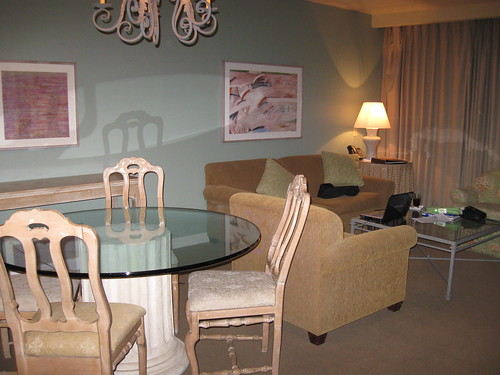There’s a Million Little Thoughts Swirlin’ Round Me
I just read Jen Wagner’s Today My Kids Have Pencilogy blog post and chuckled but then quickly realized that I am the Pencilogy teacher at my school. Yes, my students still come to the lab twice a week for 30-45 minutes at a time depending on the grade level. I sat down and figured out that if my students never have a holiday and aren’t ever sick and never leave early for a game or some event at school, my Elementary students will have 35 hours of technology instruction for the year and my Middle School students will have a total of 52 1/2 hours of technology instruction for the year. So, not only am I the Pencilogy teacher, I have very limited hours to teach whatever it is I should be teaching.
I really wish that technology in my school could be described as Chris Lehmann says “.. like oxygen: ubiquitous, necessary, and invisible.” Unfortunately, it is not. At our school, in the computer lab, we have 18 10-12 year old computers with 9GB hard drives and 256MB of memory that mostly work – slowly but they work. They don’t have the newest graphics cards and can’t run things like Google Earth and a few of them have CD drives that don’t work. There is no projector (or IWB) but we get by with a large monitor and a connection to allow projection of the screen onto a large TV – not the best resolution but it works. We do have Internet access in the lab and I’m fortunate that not much of anything is blocked. Our classrooms have, at best, 1-3 even older computers and no access to the Internet from the classrooms.
I have been struggling with what to teach during the students’ time in the computer lab and have felt guilty that we’re not integrating technology into the classroom. I have, however, come to the conclusion that I need to do the best with what I have and continue to try to find resources to make things better. To me, doing the best with what I have means that I need to teach my students the skills they will need when (not if but when) our school gets the funding to upgrade the equipment and move the technology into the classroom. So, for me this means that I will concentrate on:
- Digital Citizenship – More and more of our lives are being spent online. Employers and colleges are looking at the digital footprints of applicants. Something posted today can come back to haunt someone years from now. Many of our students apply to local private high schools and I can see the high schools looking up a student’s online presence at some point. It is imperative that students learn what it means to be a good digital citizen and I feel that this needs to be my primary focus in the computer lab.
- Productivity tools such as Microsoft Office – our students need these both now for required projects and reports and as they go to High School. I also intend to expose them to Google Docs and maybe Open Office (if I have disk space to install it) and presentation tools such as Prezi. I want them to understand what they are doing with these applications and not just where the button is they have to push to format a paragraph or change a font, for example. If they understand what they’re doing, it won’t matter what the tool is, they’ll be able to figure out how to create the document or spreadsheet or presentation they need.
- Keyboarding – I still believe that keyboarding is an important skill that students need to know and that if they learn how to touch type, they will be able to type faster and more accurately. This will only help them as they move on in school and have to type more and longer reports. I can see keyboarding going the way of handwriting as we move toward touch screens and touch pads but right now my students still need this skill so I still include it.
Does this mean that I’ve given up on trying to integrate into the classroom curriculum? Not at all. Integration is a great way to teach the productivity tools and to practice keyboarding. What better way to teach search skills, how to cite sources and how to format a report or create a presentation than by using the real work that the students need to do. Joining online projects that can integrate into the classroom and the computer lab helps me with my goal of teaching digital citizenship and how to communicate responsibly online and it helps to get the teachers excited about using technology to go along with their lessons.
Sometimes I feel like I’m the only one still stuck in this older model – still running the pencil lab. Is there anyone else out there doing the same thing? What do you feel are the most important things you should be teaching?
Note: The title of this blog post comes from the song You’ve Got No Time by The Cowsills


